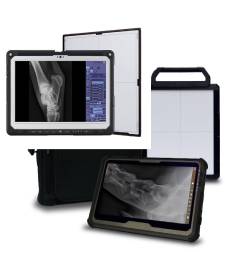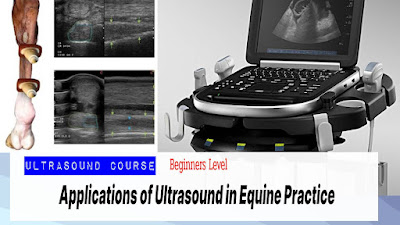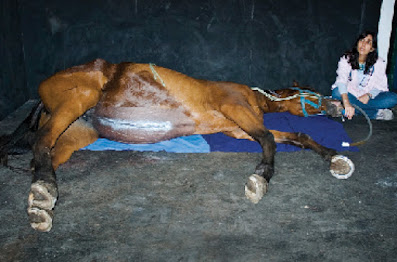In some horses, the sand travels uneventfully through the digestive tract and is passed in manure. In others, sand tends to settle into the lower areas of the intestine instead of being passed. No one can explain why individual horses vary in the way their digestive tracts handle sand. One horse in a herd will have a heavy load of sand but show no signs of discomfort; another horse will develop colic and some degree of intestinal inflammation even though it has much less sand in its colon. Likewise, a treatment that is successful in removing sand from one horse will not work as well in other horses.
Researchers from universities in Georgia, Florida, and Texas worked together to examine the records of 62 horses treated for sand colic. The records indicated clinical signs, treatments used, outcomes, and long-term survival rates.
The records showed that rectal exams were successful in finding sand in only 24% of the cases. Abdominal radiographs were much more helpful in the diagnosis. The method of mixing manure and water in a plastic bag or rubber glove, letting the mixture stand for several hours, and looking for the presence of sand at the bottom of the bag or glove was not accurate, as sand was found in less than half the manure samples where sand was confirmed by other techniques.
Study treatments included hydration and the use of laxatives such as psyllium, Epsom salts, or mineral oil. These treatments were successful in relieving discomfort for most of the horses, but were less effective in others. In 9 of the 62 horses, exploratory surgery revealed complications such as an enterolith or a twisted gut. The researchers pointed out that in horses that don’t respond to initial therapies, there may be a more serious situation than sand colic, and this will resolve with the best results if it is diagnosed and treated quickly.
Treatment with analgesics was used on the majority of horses in the study. These medications treat pain but also help to reduce tissue inflammation caused by the abrasive effect of sand on intestinal tissues. This inflammation can impair gut motility and lead to infection.
To limit the risk of sand colic, provide hay in a rack or slow-feeding device rather than feeding it from the ground. Check with a veterinarian about the advisability of giving the horse psyllium or another preventive product on a regular basis, and be sure the horse always has access to clean water.









No comments:
Post a Comment